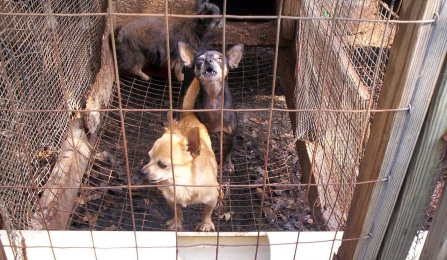Law Links - September 2014
Students stepping up against cruelty of “puppy mills”

Miniature breeds at a US puppy mill - Wikipedia.org
Municipalities wanting to keep themselves free of “puppy mills” – large-scale commercial dog breeding operations that put profits above animal welfare – have a faithful companion in the Law School’s Animal Law Pro Bono Project.
The project, a community engagement arm of the Law School’s clinical program, is working to produce a model ordinance that cities and towns can use to amend local law. The goal, says Devin Franklin, a third-year student pursuing an environmental law concentration who spent part of the past summer researching the ordinance, is to give lawmakers an easily accessible tool for regulating dog breeders and improving the animals’ living conditions.
Dogs in puppy mills, Franklin says, are “packed in as products, in situations where it’s difficult to care for as many as they have and the conditions are unsanitary, such as having too many dogs in one cage.” A New York State law passed this past January gives municipalities the authority to regulate pet dealers and breeders, provided that regulation is at least as strict as state laws enforced by the Department of Agriculture and Markets.
The initiative builds on the success of the Animal Law Pro Bono Project’s model ordinance on “community cats” – un-owned cats that live outside and help keep the rodent population in check. The City of Buffalo recently adopted a version of the model ordinance produced by SUNY Buffalo Law students and faculty, directing city animal control officers to trap, neuter, vaccinate and return stray cats back into the city. Students continue to promote the model ordinance to other local municipalities.
For that initiative, the problem was evident: By some estimates, up to 90,000 stray cats inhabit Buffalo. Professor Kim Diana Connolly, vice dean for legal skills and director of clinical legal education, says it’s unclear whether any puppy mills are still operating in Western New York. But, local animal welfare organizations have concern.
As Franklin says, “Pet stores make a lot of money by selling puppies, and often they don’t double-check the origins of their puppies and what’s going on with the breeding moms,” Connolly says. “In a sense, this is animal cruelty before it gets to the consumer. We also need people to know that there are different options than going to a pet store, such as animal rescue groups.”
Connolly and Franklin say adoption of the model ordinance puts teeth into the effort to keep such facilities away, and the hope is that if a number of local municipalities sign on, Erie and Niagara counties will adopt similar laws countywide. The completed ordinance will be made available more widely as well.
“This is a win-win,” Connolly of the initiative, which more students will join in the fall semester. “It’s a fabulous learning opportunity for the students, teaching them about statutory interpretation, about the detailed researching of codes and about advocacy to pass new laws.”
In addition to researching ordinances regulating puppy mills, Franklin has looked at a web of licensing laws requiring inspection of breeding sites, as well as “puppy lemon laws,” under which a buyer who purchases a dog that turns out to be sick has some legal recourse.
When it’s finished, Connolly says, the model ordinance will adapt easily to local needs. “You want to make sure you’re not making the best the enemy of the good,” she says. “We have to have something that’s doable and affordable for municipalities. The key to good laws is enforcement, so it has to be workable, affordable and enforceable.”
Alumni who wish to volunteer their help with the puppy mills initiative are asked to contact Kim Connolly.